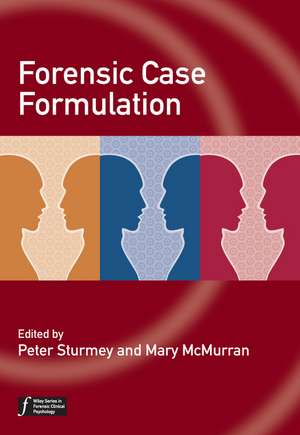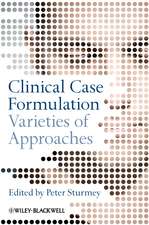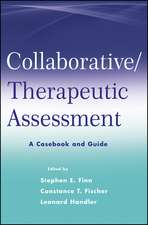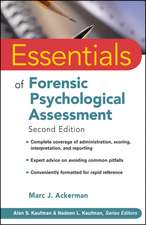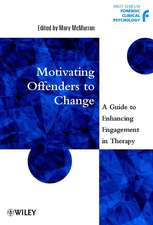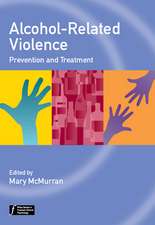Forensic Case Formulation
Autor P Sturmeyen Limba Engleză Paperback – sep 2011
- Addresses risk assessment and its implications for case formulation and treatment
- Covers a range of serious forensic problems such as violence, sexual offending, personality disorder, and substance misuse
- Offers guidance in training clinicians on ways to create useful formulations
Preț: 394.02 lei
Nou
75.41€ • 77.72$ • 63.67£
Carte tipărită la comandă
Livrare economică 04-18 martie
Specificații
ISBN-10: 0470683945
Pagini: 332
Ilustrații: black & white illustrations, black & white tables, figures
Dimensiuni: 170 x 244 x 18 mm
Greutate: 0.54 kg
Editura: Wiley
Locul publicării:Chichester, United Kingdom
Public țintă
Forensic and clinical psychologists, psychiatrists, social workers, nurses, and other practitioners in forensic services; also for undergraduate courses in forensic psychology and clinical psychologyDescriere
Effective assessment and treatment of offenders is important for reducing the likelihood of further offending. Understanding the processes which initiate and maintain offending behaviour is integral to the design and evaluation of appropriate, individually–tailored interventions. Forensic Case Formulation describes the principles and application of case formulation specifically for forensic clinical practice. In this edited volume, contributors review the fundamental aspects of case formulation, including definitions, reliability and validity. The practical applications of case formulation applied to violence, sexual offenses personality disorder, and substance abuse are described, and illustrated with case studies. Also covered is the interrelationship between case formulation and risk assessment. Forensic Case Formulation offers rich insights into the use of case formulation with forensic clients.
Textul de pe ultima copertă
Effective assessment and treatment of offenders is important for reducing the likelihood of further offending. Understanding the processes which initiate and maintain offending behaviour is integral to the design and evaluation of appropriate, individually–tailored interventions. Forensic Case Formulation describes the principles and application of case formulation specifically for forensic clinical practice. In this edited volume, contributors review the fundamental aspects of case formulation, including definitions, reliability and validity. The practical applications of case formulation applied to violence, sexual offenses personality disorder, and substance abuse are described, and illustrated with case studies. Also covered is the interrelationship between case formulation and risk assessment. Forensic Case Formulation offers rich insights into the use of case formulation with forensic clients.
Cuprins
List of Contributors. Series Editors′ Preface.
Editors′ Preface.
GENERAL ISSUES.
Chapter 1. Theoretical and Evidence–Based Approaches to Case Formulation (Tracey D. Eells and Kenneth G. Lombart, University of Kentucky, USA).
Chapter 2. Current Issues in Case Formulation (Gregory H. Mumma, Texas Tech University).
Chapter 3. Does Case Formulation Make a Difference To Treatment Outcome? (Ata Ghaderi, Uppsala University, Sweden).
VIOLENCE.
Chapter 4. Formulation of Violence Risk Using Evidence–Based Assessments: The Structured Professional Judgment Approach (Stephen D. Hart, Simon Fraser University and University of Bergen and Caroline Logan, Greater Manchester West Mental Health NHS Foundation Trust and University of Manchester).
Chapter 5. Cognitive–Behavioral Approaches To Formulating Aggression And Violence (Kevin Howells, University of Nottingham, UK).
Chapter 6. Formulation of Serious Violent Offending Using Multiple Sequential Functional Analysis (Aidan J. P. Hart, David M. Gresswell,University of Lincoln and Louise Braham, University of Nottingham).
Chapter 7. Forensic Case Formulation, Substance Abuse Disorders and Anger (Ellen Vedel, Jellinek Substance Abuse Treatment Center and Paul M. G. Emmelkamp, University of Amsterdam).
SEXUAL OFFENDING.
Chapter 8. Sexual Offenses Against Children (James Vess & Tony Ward, Victoria University of Wellington, New Zealand).
Chapter 9. Sexual Offenses Against Adults (Stacey L. Shipley, North Texas State Hospital and Bruce A. Arrigo, University of North Carolina Charlotte).
SPECIFIC POPULATIONS.
Chapter 10. Forensic Case Formulation with Children and Adolescents (Phil Rich, Stetson School, Massachussetts).
Chapter 11 Formulating Offending Behaviour In People With Mild Learning Disabilities (William Lindsay, University of Abertay Dundee, UK).
Chapter 12. Case formulation for Individuals With Personality Disorder (Lawrence Jones, Nottinghamshire Healthcare NHS Trust, United Kingdom).
CONCLUSION.
Chapter 13. Forensic Case Formulation: Emerging Issues (Peter Sturmey, City University of New York and Mary McMurran, University of Nottingham, United Kingdom).
Notă biografică
Peter Sturmey is Professor of Psychology at Queens College and The Graduate Center, City University of New York. He has published extensively on developmental disabilities, applied behavior analysis, and on issues relating to staff and parent training. Mary McMurran is Professor in the University of Nottingham′s Institute of Mental Health. She has written extensively on personality disorders, alcohol–related aggression, and readiness to engage in therapy.
